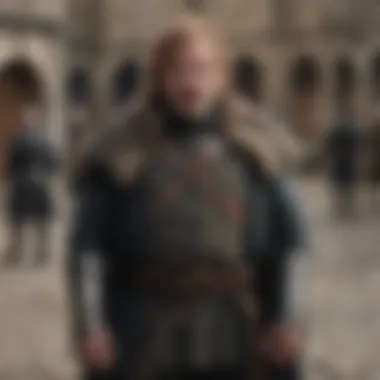The Freys: Ambitions and Betrayals in Westeros


Intro
House Frey stands as a formidable pillar within the Game of Thrones universe, representing both ambition and betrayal. This family's roots can be traced back to the Riverlands, dwelling prominently at the Twins. The architect of their fortune, Petyr Frey, strategically aligned their house with influential factions, enhancing their power and reach. However, their narrative is punctuated by treachery, notably their infamous role in the Red Wedding.
In this article, we delve into the multilayered dynamics of the Freys. From their historical lineage to their questionable moral compass, we will dissect their characters, analyze key events, and uncover how their ambition reshapes the fate of Westeros. We will examine the relationships they maintain with other noble houses and evaluate the choices that have defined their legacy, often marked by betrayal and self-serving interests.
Prelude to House Frey
House Frey occupies a unique and often controversial position in the complex landscape of Westeros. Their presence is essential to understanding the themes of ambition and betrayal within the Game of Thrones universe. This section introduces the Freys, elucidating their historical significance, political maneuvers, and the implications of their actions throughout the series.
The Freys are emblematic of the stark realities of power in Westeros, where loyalty is often contingent and self-interest prevails. Their ambition drives them to navigate the treacherous waters of political alliances and betrayals. Understanding their role and significance offers invaluable context to the intricate dynamics of the series.
Historical Background
House Frey traces its history back to a modest origin, evolving into a substantial power in the Riverlands. Founded by a single ancestor, perhaps a lesser lord, the house's rise is marked by strategic marriages and opportunistic alliances. Their seat at the Twins—a crucial crossing over the river—ensures both geographical and strategic significance.
The Freys’ participation in key events—such as their alliance with the Tullys by marriage—cemented their status. However, their reputation is marred by numerous betrayals, painting them as untrustworthy players in the game of thrones. Walder Frey, the head of the house, represents the culmination of these traits, embodying both cunning and ruthlessness.
Geographical Significance
Geographically, House Frey possesses a significant advantage. The Twins are situated at a pivotal junction along the Green Fork of the Trident, creating a vital crossing point between North and South. This location allows the Freys to control traffic and trade along the river, multiplying their influence.
Their stronghold, the Twins, consists of two towers that symbolize unity and discord. The rivers provide a natural defense, enhancing their security. Additionally, their position allows them to engage in commerce and diplomacy with neighboring houses, further solidifying their influence in the region.
Key Members of House Frey
The significance of the members of House Frey cannot be overstated in understanding their role in Game of Thrones. Individual ambitions, relationships, and decisions have shaped the fortunes of House Frey and impacted the broader political landscape of Westeros. The strategic importance of their actions during pivotal moments, particularly in the context of alliances and betrayals, requires closer examination.
Walder Frey
Walder Frey is perhaps the most critical figure in House Frey. His position as the head of the family showcases the complexities of leadership in a time rife with political intrigue. Walder is known for his cunning nature and relentless pursuit of power. He seeks to elevate his family's status through any means necessary. This often leads to questionable alliances and brutal betrayals.
His infamous decision to participate in the Red Wedding exemplifies his duplicitous nature. What he viewed as a tactical masterstroke drastically altered the power dynamics in Westeros. Despite his advancing age, Walder’s ambitions remain sharp, reflecting a hunger for relevance that drives him to orchestrate ruthless plots. Thus, Walder Frey remains a vital study of ambition turned lethal.
Cerelle Frey
Cerelle Frey, often overshadowed by her male counterparts, plays a nuanced role within the family. Married to Roose Bolton, her position grants her a unique perspective on the machinations of both the Freys and Boltons. Cerelle’s identity is closely intertwined with her husband’s brutal policies. Her loyalty is often tested by the political chaos surrounding them.
Unlike Walder, Cerelle embodies a more subdued ambition. Her efforts to maintain family continuity through strategic choices, such as her son’s upbringing, reflect a more cautious approach to power. Understanding Cerelle’s motives offers an intriguing contrast to the aggressive tactics of her family.
Riverrun Connections
The strategic location of Riverrun and its connections to House Tully make it essential to the Freys' ambitions. This castle serves as a focal point for alliances and power shifts throughout the series. Control over Riverrun not only enhances House Frey's standing but also opens doors to various political relationships.
The significance of the Freys’ connection to Riverrun lies in the Tully bloodline. The marriage alliances formed here illustrate House Frey’s efforts to infiltrate and influence powerful houses. These connections facilitate not just political leverage but also underscore the family’s strategies in times of upheaval. Therefore, understanding Riverrun’s role in the Frey narrative is crucial for analyzing their overall impact on Westeros.
The Red Wedding: A Pivotal Moment
The Red Wedding stands as one of the most significant and shocking events within the narrative of A Song of Ice and Fire. It encapsulates the themes of bloodshed and treachery that permeate through the series. The cunning orchestration of this massacre directly highlights the intricate web of alliances and enmities in Westeros. Understanding its implications helps illuminate the motivations of House Frey and their place in the greater conflict.
Planning and Deception
The lead-up to the Red Wedding is marked by meticulous planning. Walder Frey, driven by a desire for power and acknowledgment, seeks to strengthen his position through careful deception. The alliance formed with the Stark family appears to be a strategic move to elevate his status. Edmure Tully's marriage to one of his daughters offered an opportunity for collaboration between House Frey and House Stark.


However, lurking beneath the surface of hospitality is a dark intent. The ceremony at the Twins, ostensibly a celebration, serves as the perfect backdrop for betrayal. Walder Frey’s insatiable ambition blinds him to the long-term consequences of his actions. As guests gather, secrets of the past and rational calculations intertwine into a deadly game of chess.
The innermost circles of the Frey family are complicit in the execution of this plan. Cerelle Frey, though less prominent, plays a vital role as a facilitator of her father's ambitions. In the atmosphere of the wedding, betrayal is cloaked in the guise of joy. It is this chilling irony that cements the Red Wedding's reputation—an event where friendship is merely a tool for manipulation.
Consequences of Betrayal
The immediate aftermath of the Red Wedding reverberates through Westeros, altering the power dynamics considerably. The massacre results in the brutal elimination of key members of House Stark, fundamentally shifting loyalties among the remaining houses. This treachery not only devastates the Stark lineage but also plants seeds of distrust among other factions.
The consequential fallout manifests as sweeping changes in alliances. Many houses reassess their positions, and this moment acts as a catalyst for the War of the Five Kings. The Freys, once seen as a minor power, find their actions thrust into the spotlight. But the fruit of betrayal is bitter. Despite their success in eliminating rivals, they become pariahs in the eyes of many.
Furthermore, the long-term effects on House Frey are profound. Their infamy solidifies as stories of their betrayal circulate, tarnishing their once-regarded name. The Red Wedding serves as a stark reminder of the high stakes involved in the game of thrones, illuminating the oft-overlooked reality that loyalty is but a fleeting concept in the heavily convoluted politics of Westeros.
"The Red Wedding is a testament to how the ambition of one house can unravel the fabric of a kingdom. There is no joy in betrayal, only a lingering shadow of distrust that follows."
Political Maneuverings
The political landscape of Westeros is intricate and often treacherous. House Frey's position within this terrain allows for unique opportunities and challenges. Their actions reveal not just personal ambition but also the broader implications of alliances in a realm fraught with conflict. The Freys have shown a remarkable ability to adapt and forge connections, primarily leveraging their geographical location and marital strategies.
House Frey's willingness to engage in political maneuverings reflects their understanding of the delicate balance of power. This section explores how alliances and marriages are central to their strategy, providing leverage in the ever-shifting allegiances of the realm.
Alliances with the Lannisters
The alliance between House Frey and House Lannister is a study in mutual benefit, albeit often with an underlying current of suspicion and self-interest. Walder Frey, the head of House Frey, recognized the strength of the Lannisters, particularly after the death of King Robb Stark. By aligning with Tywin Lannister, the Freys amplified their influence while receiving protection over their lands and interests.
Key developments in this alliance include:
- Wedding of Edmure Tully and Roslin Frey: This matrimonial union served as a way to solidify ties and promote cooperation. Although it occurred amidst considerable tension, it showcased the lengths to which the Freys would go to secure an alliance.
- The Red Wedding: The apex of their cooperation was marked by this event. Walder Frey's betrayal was not only a move against the Starks but also established the Freys as players in Lannister politics.
- Shared Interests: Both families shared a common enemy in the Stark family, which further strengthened their association. The Lannisters provided the Freys with the means to maintain their status while the Freys offered the Lannisters additional manpower and resources.
The alliance with the Lannisters illustrates how the Freys navigated the murky waters of political loyalty, albeit at a cost. Their willingness to betray traditional bonds of loyalty is a significant theme throughout their history.
Strategic Marriages
Strategic marriages have long been a tool for the powerful in Westeros to ensure stability and promote their agendas. House Frey has engaged in this practice extensively, not just to strengthen their hold in the region but also to create networks that enhance their political clout.
A few notable points about their approach include:
- Marriages to Secure Alliances: By marrying into other noble houses, the Freys expand their reach and influence. For instance, the union of Cerelle Frey into House Lannister signifies the Frey's desire to entwine their fate with the realm's most powerful house.
- Local Connections: The Freys also strategically marry off their members to families within the Riverlands. This approach ensures local support and maintains peace within their territory.
- Utilitarian Relationships: Marriages are often viewed through a pragmatic lens. While personal feelings may enter into these unions, the primary focus remains on enhancing the family's political stature.
Themes of Loyalty and Betrayal
The themes of loyalty and betrayal are central to the narrative arc of House Frey within the broader context of Westeros. These themes encapsulate the essence of the Freys’ ambition, highlighting how their allegiances shift based on convenience and personal gain. For House Frey, loyalty is often a conditional state, dictated by the tides of power rather than by any deep-rooted commitment to allies or principles.
House Frey’s Reputation
House Frey's reputation has been shaped by their notorious actions, particularly the infamous Red Wedding. This event not only cemented their status as a treacherous family but also served as a catalyst for larger conflicts in the War of the Five Kings. Many in Westeros view them with disdain and suspicion because their actions signal that they prioritize power over honor. The portrayal of House Frey represents the darker aspects of political maneuvering in a world where betrayal can lead to survival.
The Freys’ reputation has far-reaching consequences.
- Public Perception: The perception of House Frey has influenced how other houses interact with them, often leading to cautious or hostile relations.
- Political Isolation: This perception has also resulted in political isolation, as alliances become strained due to fear of betrayal.
Understanding their reputation is crucial to grasping their motivations and the decisions they make, placing House Frey at the center of discussions on moral ambiguity in the power plays of Westeros.
Loyalty to the Crown


Loyalty to the crown has been a significant factor driving the Freys’ political strategy. Their initial allegiance to the Lannisters represents a calculated move, rooted in the desire for power. While they pledged loyalty, their commitments were often self-serving, rooted more in ambition than honor. The Freys showed their willingness to align with the crown to bolster their own claim to influence and wealth. This is evidenced by their participation in the orchestrated betrayal of House Stark during the Red Wedding, which was aimed at ensuring House Frey’s prominence in the political landscape.
The complexity of loyalty presented in House Frey can be summarized as follows:
- Strategic Alignment: Loyalty is often based on strategic considerations rather than unwavering faith.
- Flexibility: The ability to shift loyalties when necessary underscores their adaptability in a volatile political environment.
- Consequences of Betrayal: The choice to betray allies can have extensive repercussions, influencing future relationships with various houses.
"In the game of thrones, loyalty is a precious commodity, one that House Frey has often chosen to compromise for the sake of ambition."
Character Analysis
Understanding the characters within House Frey is crucial for comprehending their motivations and actions throughout the Game of Thrones narrative. In many ways, these characters are the embodiment of House Frey's ambitions and betrayals. By diving into their distinct personalities, one gains insight into how individual choices impact broader political currents throughout Westeros.
Walder Frey's Complexity
Walder Frey stands at the center of House Frey’s narrative. He is not merely a lord but a symbol of opportunism and strategic calculation. At first glance, one might see him as a simple, greedy figure eager to augment his influence. However, Walder's character is more nuanced than that. His decisions stem from a history of feeling slighted by major houses, particularly during Robert's Rebellion, where his contributions were overlooked. His desire for recognition influenced his choices, leading him to forge alliances through marriage and war, often with devastating consequences.
Walder's complexity is revealed in his relationships. He oscillates between being pragmatic and vindictive. This duality allows him to maneuver through the dangerous political landscape of Westeros effectively. His choice to betray the Starks during the Red Wedding illustrates not only his desire for power but also his need to solidify his family's status. Furthermore, his willingness to sacrifice those close to him for ulterior motives highlights a deeply ingrained sense of self-preservation.
Cerelle Frey's Role
Cerelle Frey, married to Roose Bolton, plays an intriguing role within House Frey. Her character exemplifies the influence of women in a patriarchal society. Although often overshadowed by her husband, Cerelle navigates political machinations with a keen sense of awareness. She is not just a pawn in the game but an active participant with her own ambitions. Cerelle's marriage to Roose serves to solidify the alliance between House Frey and House Bolton, but it also places her in a precarious position.
Throughout the story, Cerelle's motivations become clearer. She desires to elevate her family's standing and to protect her children. Her input in decision-making, while not always highlighted, is evident through her subtle yet impactful actions. For instance, during key discussions about strategy, her perspective brings forth a maternal instinct, emphasizing the significance of securing her children's futures.
Symbolism of the Twins
The Twins, a prominent stronghold of House Frey, carry a great weight of significance within the intricate tapestry of Westeros. Their unique architectural duality, along with their strategic importance, influences the narrative in essential ways. The physical embodiment of the Twins symbolizes the essence of House Frey itself—ambition, duality, and betrayal. Understanding the importance of this symbol helps to uncover the more complex themes associated with House Frey and its involvement in critical events throughout the series.
Cultural Significance
The cultural implications of the Twins extend beyond mere geography. They represent the fine line between loyalty and treachery—a characteristic trait of House Frey. In Westeros, where allegiances shift and betrayal is often rewarded, the symbolism of the Twins resonates deeply. The two towers of the Twins, each representing the two aspects of Frey identity, highlight this duality. These elements underscore the morally ambivalent nature of the Freys, placing them as players on a game board dictated by ambition.
Moreover, the Twins serve as a venue for significant political gatherings. Being a part of the Riverlands, the Twins are essential in controlling trade routes that are vital to the economy of Westeros. The Freys have leveraged this cultural significance to build their influence, manipulating traditions and expectations to serve their goals. Hence, they facilitate not only the economic but also the social fabric of alliances, affirming their position as key players in the overall power dynamics of Westeros.
Architectural Relevance
Architecturally, the Twins are both impressive and strategic. They consist of two towers connected by a bridge over the Green Fork of the Trident. This structure is more than just a physical representation; it is a carefully designed fortress that embodies the ambitions of House Frey. The design reflects not only defensive capabilities but also a means to monitor and control movements within the region. The interconnectedness of the two towers symbolizes the unity and cooperation that House Frey often seeks to project.
While the architects of the Twins intended this stronghold to signify strength and stability, it also becomes a metaphor for vulnerability. The very structure that provides security can also facilitate deceit. The bridge, allowing easy passage, symbolizes the ease with which loyalties can shift in Westeros, illustrating how quickly alliances can turn sour.
Impact on the War of the Five Kings
House Frey's impact during the War of the Five Kings cannot be overstated. Their actions played a crucial role in shaping the war's dynamics and outcomes. The Freys, primarily known for their ambitions, leveraged their strategic position to become key players in a conflict that saw multiple factions vying for power. By marrying into different houses and creating alliances, they positioned themselves to influence the balance of power in Westeros.
One significant point of their involvement was their participation in key battles. The Freys often aligned with factions they believed would be most beneficial for their house. This showed their opportunistic nature. Their alliance with the Lannisters at the Red Wedding effectively ended Stark power in the Riverlands.
Additionally, the Freys were at the center of various strategic marriages that enhanced their political standing. These unions not only solidified alliances but also increased their influence over the war's direction.
When analyzing their impact, several elements emerge:
- Strategic Positioning: The Freys controlled the Twins, an essential river crossing, giving them logistical advantages in battle.
- Betrayals and Consequences: Their willingness to betray allies, most notably House Stark, allowed them short-term gains while fostering long-term enmities.
- Power Dynamics: They contributed to reshaping the power landscape of Westeros, setting the stage for future conflicts.
Understanding House Frey's role in the War of the Five Kings is vital for grasping the overall narrative of A Song of Ice and Fire. Their ambitions and betrayals illustrate the complex web of loyalties that define the series.


Frey Involvement in Key Battles
House Frey was involved in several key battles during the War of the Five Kings. The most notable was the role they played in the Red Wedding. This event marked a significant shift in power dynamics. It was a calculated betrayal that allowed the Freys to secure a dominant position by eliminating one of their strongest rivals, House Stark.
Frey forces participated in other minor skirmishes, often aligning themselves with whichever faction seemed to offer the most substantial benefit. Their involvement in these battles showcased their pragmatic approach to warfare. They were not driven by traditional notions of honor but by a desire for power and security.
Shifting Alliances
The concept of shifting alliances characterized House Frey’s approach to the War of the Five Kings. Their alliances were not based solely on loyalty or friendship; instead, they were driven by self-interest. The Freys frequently reassessed their alliances to align with the rising powers in Westeros. This opportunism not only provided them short-term advantages but also painted them as unreliable allies among other houses.
- With the Lannisters: After the Red Wedding, the Lannisters became their primary allies. This was a strategic move to ensure protection and favor from one of the most powerful houses.
- Against the Starks: Their betrayal of the Starks created a significant rift. Originally seen as allies, the Freys’ actions led to the Stark downfall. The Freys underestimated the potential repercussions of their betrayal against a family that once offered them support.
By constantly shifting allegiances based on prevailing circumstances, the Freys illustrated the harsh realities of political maneuvering during the War of the Five Kings. This adaptability made them integral players in the ongoing conflict while demonstrating the volatility of power in Westeros.
Critical Reception of House Frey
Understanding the critical reception of House Frey is essential within the context of their role in Westeros. This section examines how fans and scholars perceive the Freys, considering their actions and impact on the narrative. The Freys are often framed as symbols of ambition and betrayal, which invites a spectrum of interpretations. The complexity of their characterizations fuels discussion and scrutiny throughout the fandom and academic circles. By exploring these perspectives, the article aims to uncover the implications of House Frey's actions and the broader themes they represent in George R.R. Martin's work.
Fan Perspectives
Fan reactions to House Frey are crucial for understanding their place in the wider Game of Thrones lore. Many fans see the Freys as one of the most detestable families in the series due to their involvement in the Red Wedding. They are often described as opportunistic and ruthless, particularly Walder Frey, who is perceived as the epitome of betrayal. This sentiment has fostered a rich tapestry of fan theories and discussions across platforms such as Reddit.
Some fans enjoy dissecting the motives and justifications behind the actions of the Freys. For them, the complexity of character provides a rich field for analysis. Discussions often revolve around how the Freys reflect the brutal nature of power politics in Westeros.
Key points in fan discourse include:
- The portrayal of Walder Frey as a villain
- Cerelle Frey’s complex role and motivations
- The moral implications of the family's actions during the war
Scholarly Analysis
In contrast, scholarly analyses of House Frey often approach the family from a critical perspective, focusing on the societal and economic factors that shape their motivations. Scholars argue that the Freys exemplify the Machiavellian aspects of leadership prevalent in the series. Their strategies, while perceived as treacherous, can also be interpreted as calculated decisions driven by survival instincts within a harsh reality.
A notable aspect of this analysis is how House Frey embodies the theme of ambition. They are frequently contrasted with other Houses, such as the Starks and the Lannisters. In academic literature, the Freys serve as a case study in how ambition can lead to both success and downfall in a world characterized by instability.
Noteworthy components in scholarly examination include:
- The ethical landscape of loyalty and betrayal
- The socio-economic implications of House Frey's alliances
- An exploration of gender roles through Cerelle Frey’s character
"The Freys are often viewed through a lens of opportunism, yet their actions reveal deeper tensions within the fabric of Westeros."
Overall, the critical reception of House Frey reflects a microcosm of audience engagement with the narrative. Fans and scholars alike enrich the discourse around this family, illustrating the depth of complexity in George R.R. Martin's creations.
Current Implications in A Song of Ice and Fire
Exploring the legacy of House Frey extends beyond its historical actions, reflecting ongoing themes within the A Song of Ice and Fire universe. The Freys symbolize the complex interplay between ambition and loyalty, which continues to resonate in the realm of Westeros. Their decisions and alliances have shaped not only their own fate but also the larger political landscape, demonstrating how one house can influence the trajectory of kingdoms.
Frey's Legacy
House Frey's legacy is intricately tied to the infamous Red Wedding. This event redefined the concepts of honor and betrayal within the series. The impact of this act of treachery serves as a reminder of the fragility of alliances. While House Frey gained immediate power through this betrayal, the long-term consequences were profound. Many houses reevaluated their loyalties. Supporting the Freys meant aligning with a family willing to commit unforgivable acts for gain.
The repercussions of the Red Wedding highlighted how ambition can lead to downfall. The Freys’ desire for power led them to overextend their reach, inciting the wrath of other houses. It also showcased the idea that betrayals can unravel into cycles of revenge. The legacy of House Frey is an illustration of how deeply personal motivations intertwine with political ambitions.
Future Speculations
Looking ahead, the future of House Frey appears precarious. The dynamics of power within Westeros are ever-changing. Given the growing unrest in the realm, it is likely that House Frey's actions will continue to reframe alliances. ****As potential conflicts emerge, the question arises: Will the Freys adapt or become victims of their past decisions?
There is speculation regarding potential strategies the Freys might employ to navigate the evolving political landscape. They may seek new alliances or even attempt to distance themselves from past betrayals. Whether they can secure their place without repeating their historical misjudgments remains uncertain.
Overall, the narrative of House Frey serves as a crucial component in understanding the larger themes of ambition and betrayal within A Song of Ice and Fire. Their story is not merely a reflection of past events but a continuous dialogue on the implications of power dynamics in a world rife with conflict.



